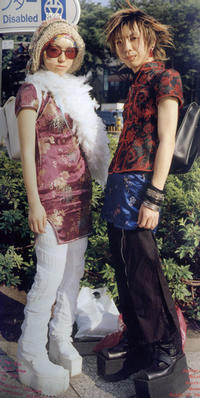| Society and Culture | 2003-01-23 23:45 2 comments |
 by Flemming Funch by Flemming FunchJames Carse makes some very interesting distinctions between what is a society and what is a culture in his book "Finite and Infinite Games" [which I mentioned here]. "In their own political engagements infinite players make a distinction between society and culture. Society they understand as the sum of those relations that are under some form of public constraint, culture as whatever we do with each other by undirected choice."Society consists of what people do because of necessity, because they HAVE to. Society is a finite game with certain rules that have to be adhered to. Society will perpetuate rules from the past and will resist any changing of the rules. Society has a lot to do with achieving and maintaining power, largely based on the games one has won in the past and the status one has achieved from that. A society is bounded temporarily and spatially. There is a start and an end to a society, and it will defend its borders and its definition vehemently. Members of a society are only those who live within its boundaries and agree to the validity of its rules. A culture, on the other hand, is not bounded. Anybody at any time anywhere can participate in a culture. In a society deviation is considered anti-social and carries various sanctions and punishments. This is becaues it is in the vested interest of society that rules don't change. If somebody comes along and changes the rules, or causes some rules to be dropped, then past winners might no longer command the same power based on their former winning status. For example, Communist Party officials in Russia. It is a highly valued function of society to prevent changes in the rules. Such functions as academic degrees, trade licences and election procedures for political office are all examples of society protecting and enforcing the existing rules and allowing people to win only by using them. "Deviancy, however, is the very essence of culture. Whoever merely follows the script, merely repeating the past, is culturally impoverished."A society is encouraging and enforcing specific but abstract rules. Society is an abstract construct built on the results of the games and struggles of the past. It is always an external phenomenon, always something one is in a somewhat alienated and adverse relation to, even if one has harvested great power in it. "For example, it is one thing for persons to choose to be Americans, quite another for persons to choose to be America. Societal thinking easily permits the former, never the latter."In other words, as a member of society you are never allowed to simply BE society and act spontaneously. You are always measured against the accumulated rules of the past. You can BE a culture. You can build on the experiences of the past and spontaneously continue the culture in your own original way. I think there is great promise in clarifying these distinctions. A society will by its very definition resist change. Culture is a force of change in itself. Seems that cultural values and cultural expression will be essential elements needed to change our world for the better. Maybe what we need is to change our perspective from social to cultural. [This is from an old article of mine, from 20 Jan 1995] |